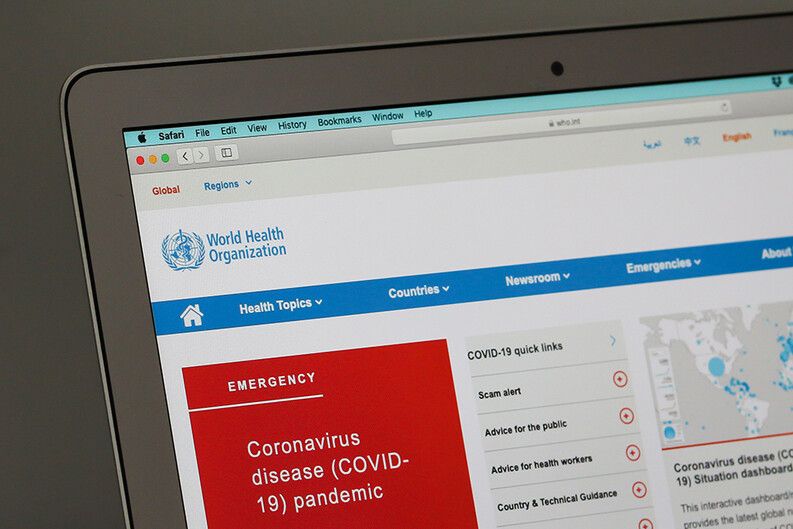The Law and the End of the COVID-19 Public Health Emergency

The federal COVID-19 public health emergency ended on May 11 as did many pandemic-era emergency declarations and rules that had been in place for more than three years. The World Health Organization also declared the virus was no longer a global health emergency at its meeting on COVID-19 on May 5. It had originally declared the coronavirus outbreak to be a public health emergency of international concern in January 2020.
In recent commentaries, Yale Law School faculty members Abbe R. Gluck ’00 and Cristina Rodríguez ’00 discussed what comes next as these official declarations deem the pandemic behind us.
Inequality and Preparation for the Next Pandemic

Writing in Health Affairs, Abbe R. Gluck and Lawrence Gostin, the director of the World Health Organization Collaborating Center on National and Global Health Law at Georgetown University, reminded readers that the pandemic “vividly revealed just how inequitable our society had become.”
The emergency orders helped create “a health and social safety net for millions of Americans, ranging from expanded Medicaid eligibility and a national vaccination campaign to being able to Zoom with your doctor or receive medication for substance-use disorder at home,” Gluck and Gostin write.
Congress expanded access to both public and private health insurance coverage during the emergency, which sharply lowered uninsured rates. The emergency did more to accelerate widespread acceptance of telehealth “than years of advocacy were able to accomplish,” Gluck and Gostin note. That progress, they argue, made possible by the “galvanizing power of an emergency,” needs to be made permanent.
Public health infrastructure in the U.S. was neglected long before the pandemic began in 2020, with the public health workforce shrinking more than 15% from 2008 to 2019.
“We blamed ourselves in 2020 for the serious lack of investment in public health that left us so unprepared,” they write. “But now the emergency is ending without significant new investments in the Centers for Disease Control and Prevention, surveillance technology, or local public health infrastructure. In many ways, with public trust in science plummeting, we are even less prepared than we were in 2020.”
READ: “Why The End Of The Public Health Emergency Really Matters” in Health Affairs
The Future of Immigration Policy

When the federal public health emergency for COVID-19 ended, so did the government’s Title 42 border policy. The policy, deemed an emergency public health measure, authorized immigration officials to expel migrants trying to enter the U.S.
Critics say that the order allowed border agents to “turn away desperate migrants fleeing violence and humanitarian calamity without any consideration of the asylum claims the law entitled them to make,” Cristina Rodríguez and co-author Adam Cox, the Robert A. Kindler Professor of Law at NYU School of Law, write in Just Security.
The end of Title 42 means that border enforcement will once again be governed by Title 8 of the U.S. Code — “replacing a fast and inexpensive border enforcement policy with a much slower one that requires far more money, personnel, and infrastructure,” according to Rodríguez and Cox. Though Title 8 enforcement would permit migrants to apply for asylum, it also means that migrants who are expelled can be barred from reentry for at least five years and those who attempt to reenter illegally can face severe criminal penalties.
But the Biden administration does not intend to return to asylum processing as usual now that the COVID-19 emergency has come to an end. Rodríguez and Cox say that much bigger changes are taking place — “a wholesale creation of a new system of humanitarian protection for migrants from Central and South America.”
New plans involve requiring asylum applicants to use a mobile app that, according to Rodriguez and Cox, creates an “opaque queuing system” from outside the United States.
At the same time, the Biden administration has introduced new parole initiatives that would allow in tens of thousands of new migrants from select countries and plans to launch processing centers for migrants abroad.
Rodríguez and Cox say that humanitarian protection is “not at its end,” but rather is being reimagined as a “suite of policies” with a new system for an already complex immigration environment.
“The problem in need of solution is not only the government’s potential failure to abide by existing asylum law in one way or another, but also that the law itself is outmoded as a means of addressing the humanitarian and security concerns of our hemisphere,” they write.
READ: “The End of Asylum?” in Just Security
LISTEN: “A New Era for U.S. Asylum” on the Just Security podcast
Abbe R. Gluck ’00 is the Alfred M. Rankin Professor of Law and the founding Faculty Director of the Solomon Center for Health Law and Policy at Yale Law School. She is also Professor of Internal Medicine (General Medicine) at Yale School of Medicine and a Professor in the Institution for Social and Policy Studies at Yale.
From November 2020 until November 2021, she served in the Biden Administration as Special Counsel to the President. In that capacity, Gluck was the lead lawyer for the White House COVID-19 Response, first for the Biden-Harris Transition and then in the White House, as Special Counsel to the White House COVID-19 Response Team. Gluck also simultaneously served as a member of the White House Counsel’s Office, where she was additionally responsible for litigation and policy relating to health care, USDA, and Veterans Affairs across the administration. Her next book, Covid and the Law: Disruption, Impact and Legacy (with Cohen et al.) comes out later this year.
Cristina M. Rodríguez ’00 is the Leighton Homer Surbeck Professor of Law and Counselor to the Dean at Yale Law School. Her fields of research and teaching include constitutional law and theory, immigration law and policy, administrative law and process, and citizenship theory.
In 2021, she was appointed by President Biden to co-chair the Commission on the Supreme Court of the United States. Her recent writings include the 2020 Foreword to the Harvard Law Review, “Regime Change,” and the book, The President and Immigration Law, co-authored with Adam Cox and published by Oxford University Press in September 2020.


